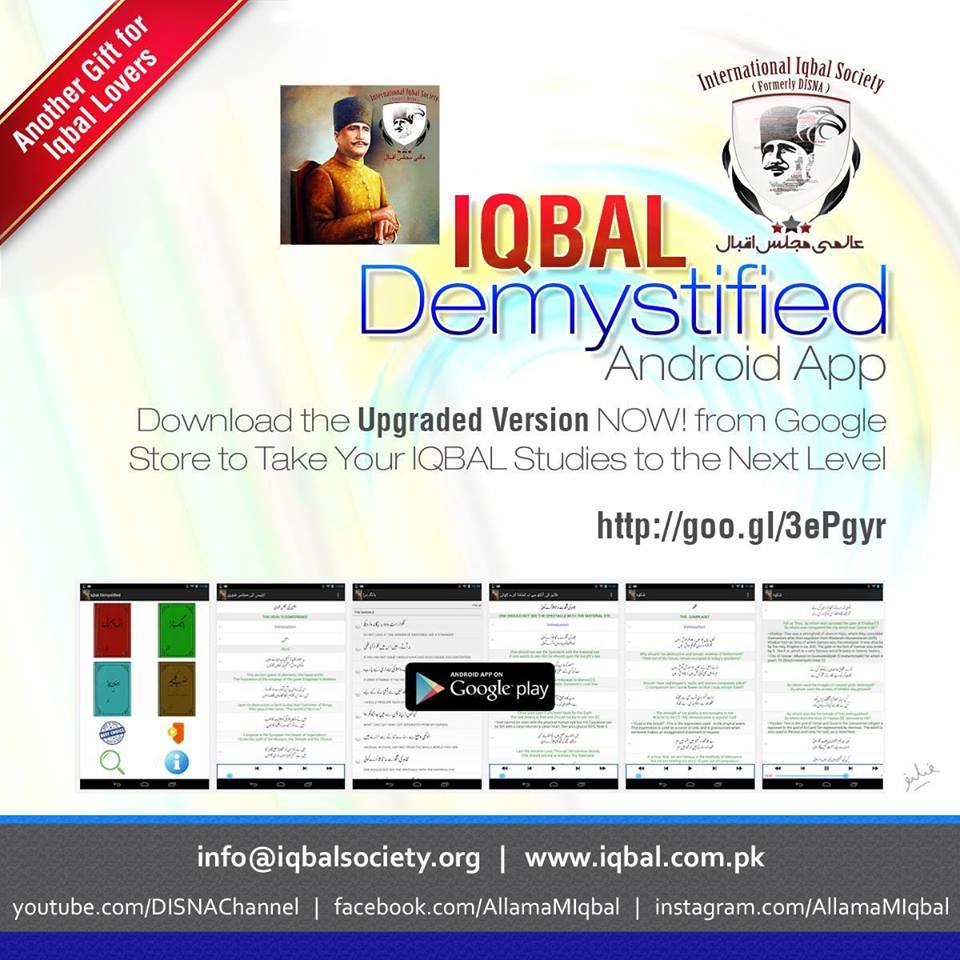The Futurist
Dr. Maqsood Jafri
I am the poet of tomorrow, claimed Dr Allama Iqbal who was a great Muslim philosopher-poet of the Subcontinent. Any man who has a bit understanding of Iqbal would bear me out that he was a man with profound knowledge of history, religion, political science, philosophy, literature, and modern sciences.
He possessed an acute insight to analyze the fate of different nations. He was splendidly saturated with the glistening pearls of Eastern and Western revolutionary movements. He had seriously brooded over the past, critically judged the present and clearly envisaged the future of humankind. In the words of Thomas Carlyle, “a poet is a seer.” And Iqbal was the top grade seer of the world who had seen the coming ages in the crystal clear mirror of realities. Like a true devotee he solemnly prayed to God to grant him special vision for a high understanding of realities. He says:
“O; God give me a heart that can see the inside;
Give me the sight that can see intoxication in the wine.”
It is necessary for a seer that he should directly be in contact with the present and study the world around him with critical eyes. The Greeks were of the view that a poet was a creator and had prophetic vision. The common poet just presents life as it is. His presentation of life is photographic He does not beautify or glorify the human life. Some poets present a critical view of life.
They either degrade life or exaggerate it. But great poets always study life with the eyes of reality and present the solutions of world problems. In doing so, they render the job of prophets. Allama Iqbal had really rendered the job of a prophet as the Holy Prophet had said:” The scholars of my Ummah would be like the prophets of the Israelites.” So Iqbal says:
“Do not consider my frenzied tune as mere attempt at versification;
For sooth I am conversant with the secrets of tavern.”
I don’t find any exaggeration in the claim of Iqbal when he announces to be the advocate of liberty of ego which ultimately is the message against all sorts of complexes. Sir Maurice Bowra about the prophetic mission of a great poet says: “It is at least clear that at the certain stage of its development, poetry is largely concerned with the revolution of special kind of knowledge and so the task of prophets who get their information from the muses or a god or a familiar spirit or the strange voyage of their own disembodied souls.”
Iqbal was conscious of his revolutionary and philosophical importance in the making of posterity and toiled day and night to give a clear cut picture of future systems. Jean Paul Sartre, the famous existentialist French philosopher believes in the purposefulness of literature. Literature without conviction is like a wall of sand that can be easily swayed by a single stroke of gusty wind. Iqbal in the capacity of a seer believed in the prophetic mission of poetry and hence said:
“If the object of poetry is to invest humans with creative qualities;
Poetry is direct succession to prophethood.”
Here I would like to quote William Blake to emphasize the mystical, revolutionary and prophetic mission of a poet:
“Hear the voice of a Bard;
Who present, past and future sees,
Whose ears have heard
The Holy Word,
That walking among the ancient trees.”
Once again I would like to cite a verse of Iqbal in which he expresses his prophetic duties as a poet:
“I have lit the lamp of Ego,
For the Moses’ hand is hidden under the sleeve”.
Who can deny this hard fact that Iqbal burnt like a candle and gave light to the Muslims of the Subcontinent in particular and to the Muslims of the world in general. The thickened clouds and lengthening shadows of slavery withered away by the flash of his staunch faith in liberty.
The creation of Pakistan is one of the greatest realities which came out of the noble dreams of Iqbal .He could foresee the emergence of a number of free and independent Muslim States in 1932 when he visited the Mosque of Cordova. How beautifully he composed the following verses:
“Deeply slumbered Chinese are awakening,
And the springs are oozing from Himalayan Mountains.”
The British philosopher Bertrand Russell in an article captioned,” The Reawakening of China” had also predicted the strong future of China. Many predictions of the poet of the East have come true. About Iran’s mighty future Iqbal had also predicted in a couplet as such:
“If Tehran becomes the Geneva of the Eastern Nations,
May be the destination of the Earth alters.”
He in his Persian and Urdu verses very pathetically has mourned over the miserable plight of the Kashmiris who since many decades are being persecuted by the Indian tormentors and predators. He was very optimistic about the bright future of the Kashmiris. His forefathers were Kashmiris. Hence in a Persian couplet he says:
“My body is a rose from the garden of Kashmir,
My heart is from Hejaz and my melody is from Sheraz.”
I am of the view that Iqbal, being the proponent and renovator of the Muslim renaissance, champion of social justice, banner-holder of liberty, torch-bearer of equality and the exponent of world peace is still a paradox that needs more attention for the right understanding of his message. Iqbal can only be understood with an open mind and deep love for reformation, revolution and soul-searching. With the passage of time as the world is getting new turns and science is revealing the new vistas, avenues, and mysteries of the complex cosmos, Iqbal’s message would be more clearly understood, and implemented as he himself proclaimed:
“After me they will read my poetry, grasp it and say,
A self-conscious man has revolutionized the world.”
As he believed in change and aspired for a new world it can be rightly said that he is the poet of tomorrow. He is the poet of future and was a futurist.
Courtesy:
The Nation, Lahore, April 21, 2005






